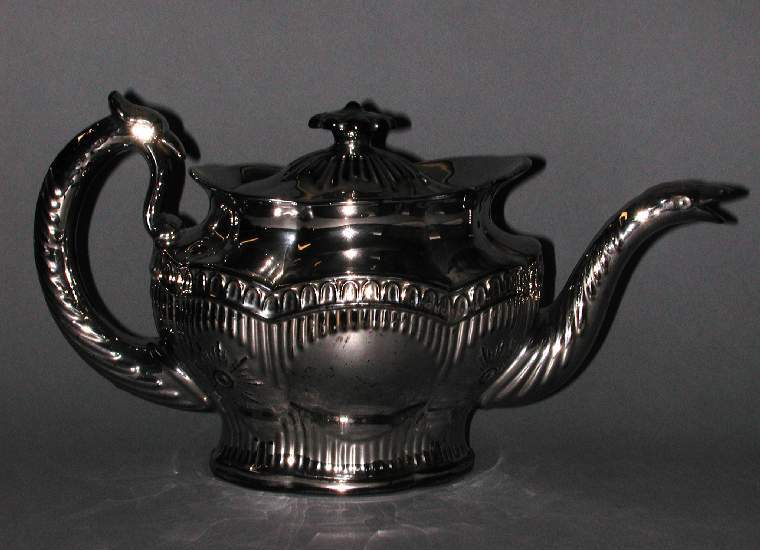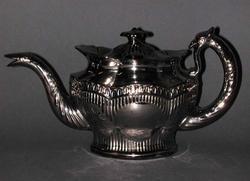Current Location: In storage
Titles
Silver lustre tea pot
Maker(s)
Unidentified factory
Entities
Categories
Description
Dark red-grey earthenware, moulded and dipped in silver (platinum) lustre.
Teapot and lid entirely covered in silver lustre. The pot has an oval body, the sides divided into three lobes on either side, moulded with gadroons surrounding reserve panels. The spout is in the form of swan’s neck, the high loop handle has an eagle’s head as thumb piece, the neck is galleried. The cover is domed, with a central, flattened knob and a deep interior rim which sits into the pot. The underside is flat and partly lustred, with a narrow foot-rim.
Notes
History note: Bought from Mr Woolston of Hyde Park Corner, Cambridge on June 29, 1908, for 26/- (one pound six shillings), by Dr J.W.L. Glaisher, Trinity College, Cambridge.
Legal notes
Dr J.W.L.Glaisher Bequest, 1928
Measurements and weight
Height: 15.8 cm
Width: 30.5 cm
Acquisition and important dates
Method of acquisition: Bequeathed
(1928)
by
Glaisher, J. W. L., Dr
Dating
19th Century, first half
Circa
1820
CE
-
1840
CE
Note
All over lustring was widely used to imitate Georgian silver, enabling the less well-off to enjoy ‘silver’ tea services, salt & pepper pots, candlesticks and similar items. From c1840, however, production dwindled with the introduction of relatively cheap electro-plating. Copper lustre coating was also popular in the 1830s, though was more often combined with other decorating techniques.
English lustreware was commercially produced from c.1805 and popular throughout the first half of the 19th Century. Staffordshire potters were the first and largest producers, though similar wares were also made in other regions and pink lustreware is often particularly associated with Sunderland. Minute amounts of gold were used to produce copper, gold, pink or purple lustre, depending on the type of clay, lustre formula, number of layers and firing temperature; platinum was used to mimic silver. Silver lustre was produced by dissolving platinum in aqua regia (nitric and hydrochloric acids) suspended in a resinous medium such as spirits of tar. Pots were dipped in the lustre solution to produce an even all-over coating and then fired at a low temperature, which burned the medium away to leave a ‘silver’ surface. Most lustreware was made for everyday use, and factory markings are rare.
The collection also hold a similarly moulded milk jug.
Components of the work
Decoration
composed of
lustre
( silver (platinum))
Materials used in production
Red earthenware
Techniques used in production
Moulding
: Earthenware, moulded and dipped in lustre.
References and bibliographic entries
Identification numbers
Accession number: C.1172 & A-1928
Primary reference Number: 71454
Old object number: 2807
Stable URI
Audit data
Created: Saturday 6 August 2011
Updated: Monday 29 April 2024
Last processed: Monday 4 August 2025
Associated departments & institutions
Owner or interested party:
The Fitzwilliam Museum
Associated department:
Applied Arts





